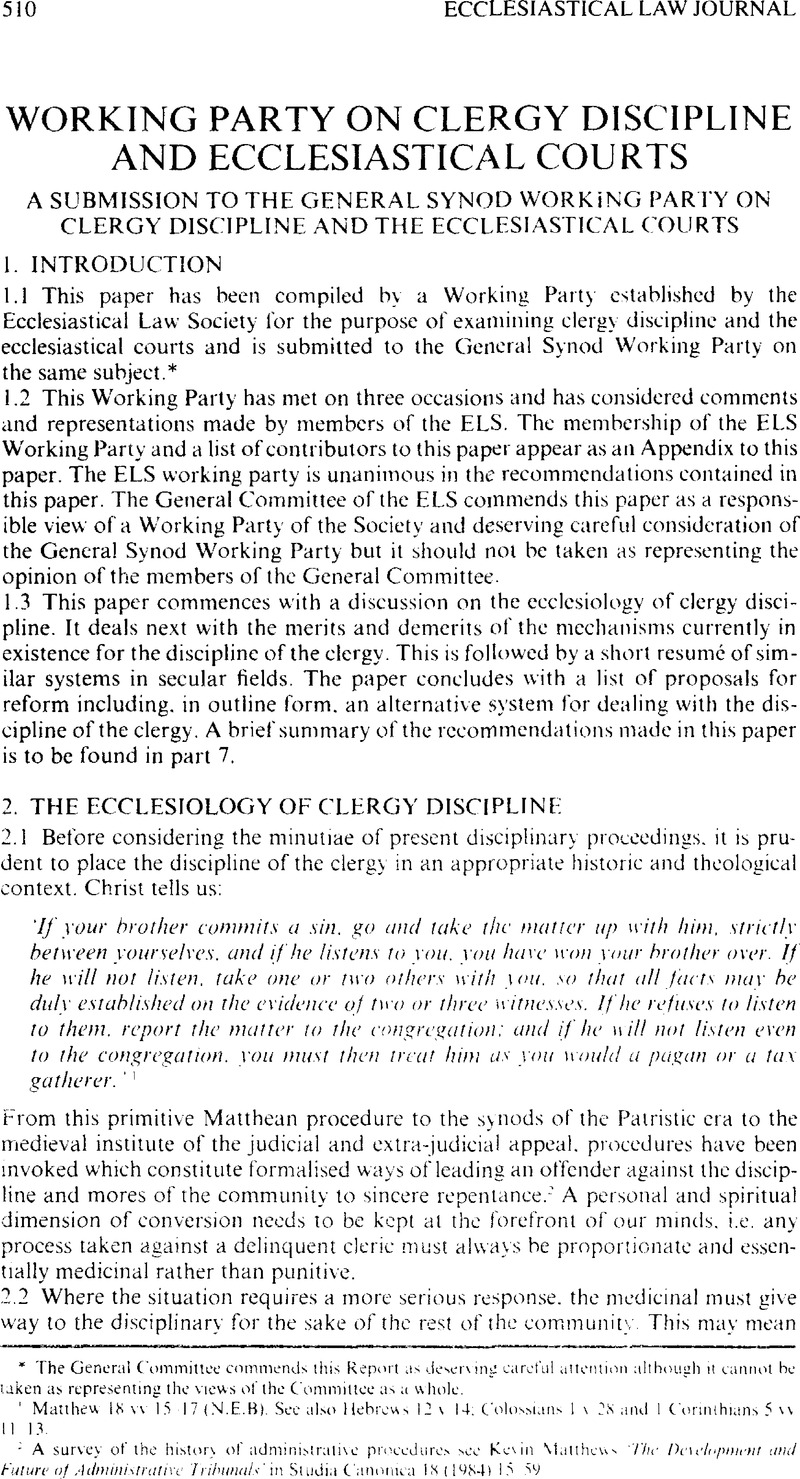No CrossRef data available.
Article contents
Working Party on Clergy Discipline and Ecclesiastical Courts
A Submission to the General Synod Working Party on Clergy Discipline and the Ecclesiastical Courts
Published online by Cambridge University Press: 31 July 2008
Abstract

- Type
- Working Party Reports
- Information
- Copyright
- Copyright © Ecclesiastical Law Society 1996
References
1 Matthew 18 vv 15 17 (N.E.B). See also Hebrews 12 v 14: Colosians 1 v 28 and 1 Corinthians 5 vv 11 13.
2 A survey of the history of administrative procedures see Matthews, Kevin. ‘The Development and Future of Administrative Tribunals’ in Studia Canorata 18 (1984) 15 59Google Scholar
3 Preface to the Ordination of a Bishop. ASB 1980 page 388.
4 A similar position is held by the person or body which is Ordinary of a non-diocesan unit. Throughout this paper the term ‘Bishop’ means the diocesan bishop or. mutatis mutandis the Ordinary equivalent to a diocesan Bishop.
5 See in particular pages 349 to 356. See also Chapter IV ‘Clergy’ at pages 226 to 231 covering clergy discipline, vacation of benefices, retirement and removal of priests.
6 See in particular the two appeals in the recent case of Burridge v. Tyler.
7 The domestic law of the University as opposed to the canon law of England.
8 In recent years issues of plagiarism and cheating have been widely ventilated in the University Courts.
9 Different provisions apply to assistant curates and priests exercising a bishop's licence. This are discussed in Hill ‘Ecclesiastical Law’ (op cit.) at pp. 224–6. The employment status of such persons has been discussed in a number of recent industrial tribunal cases including the Coker litigation which is awaiting determination by the Employment Appeal Tribunal. The working party commends a uniformity of approach in clergy discipline irrespective of whether or not the clerk is beneficed.
10 This is preferred to ‘inquisitorial’ which expression has acquired sinister overtones.
11 Some 13 at present.
12 It is anticipated that within a relatively short period of the implementation of these recommendations a number of archdeacons, chancellors, registrars, promoters and advocates will emerge with the necessary expertise and experience to form specialist panels which can be called upon as required.
13 A precedent for the issuing of such rules is to be found in the Incumbents (Vacation of Benefices) Measure 1977 (as amended), the Care of Churches and Ecclesiastical Jurisdiction Measure 1991 and the Care of Cathedrals Measure 1990.
14 Automatic deprivation should continue in its present form (subject to any necessary modifications in relation to divorce law) in respect of certain proceedings in secular courts. See Ecclesiastical Jurisdiction Measure 1963, ss. 55–7.
15 When the final draft of this paper was considered by the General Committee of the Ecclesiastical Law Society a significant majority of those present considered that the composition of any clergy disciplinary tribunal which had to consider a matter of doctrine should be differently constituted as is the case at present. The working party remains of the opinion that its recommendation at 5.6.17 is appropriate and adequate.
16 In many cases it will be appropriate to involve an Archdeacon from another archdeaconry (or indeed diocese) who will be unknown to the individuals concerned and better able to deal impartially with the complaint. It should be noted that, as is the case under the Cure of Churches and Ecclesiastical Jurisdiction Measure 1991. an acting archdeacon need not even be a priest. It is anticipated that there would be many occasions in practice where a lawyer might be better able to discharge this role.
17 Proper provision will have to be made for occasions when there is a Vacancy in See.
18 These rules should cover pastoral issues as well as legal ones.
19 See paragraphs 5.6 et seq.
20 Such privacy will not infringe the provisions of Article 6 of the Convention for the Protection of Human Rights and Fundamental Freedoms being ecclesiastical proceedings governed by internal norms.
21 The working party expressly rejects any suggestion that the Bishop shall have any discretion at this stage of the proceedings. Having elected to initiate court process the Bishop should be bound by its conclusion.
22 Note, however, footnote 15 ante which summarises a reservation expressed by the General Committee of the Ecclesiastical Law Society.
23 Hereafter, for convenience, referred to merely as The Court of Arches.
24 On the broader issues concerning this subject see paragraph 6.7 below.
25 Although it will be noted that the number of such persons is decreasing, hence the rationale for introducing identical procedures tor beneficed and unbeneficed clergy alike.
26 See the Incumbents (Vacation of Benefices) (Amendment) Measure 1993 which made major changes to the earlier measure. This is fully discussed in Hill ‘Ecclesiastical Law’ (op cit) at pages 221 to 230.
27 Note, however, footnote 15 (supra).




